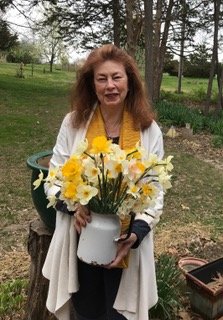Beneath the Pain
With April, the possibility of an early spring snow is always in the air. One day teases us with early bouquets of crocuses and daffodils. The next day could just as easily freeze tender pea shoots and fledgling rows of lettuce emerging in our garden.
When a string of warm days arrives in April, farmers and gardeners alike abandoned indoor tasks to work in their fields and yards. For farmers, it is time to plant crops before the spring rains. Planting goes on around the clock. Wives deliver sandwiches at mealtimes, knowing that planting will go on well into the night. If predicted rains fail to come, farmers shun sleep and continue their race against the spring clock. Beneath the pain that farmers feel by the third straight day of planting lies the promise of an abundant harvest the following summer. There will be time enough for sleep after the rains come.
In my own garden, I clean out established beds little by little so spring won’t get ahead of me. Orderly patterns of delicate flowers planted last fall push up against the tangle of dead leaf debris. Armed with a rake, a wheelbarrow, clippers, and a hoe, I clear autumn leaves now dry and brittle that have provided ground cover over winter. Once into the task, I forget about time. Hours pass. Morning moves unnoticed into afternoon. It is as though I have left my own body for those hours—to be carried on warm winds to distant worlds. Alone with my thoughts, I travel back across time wherever the winds blow.
One spring afternoon, I recall a severe earthquake that devastated the ancient Chinese town of Lijiang in 1996. Few outsiders ever wander through this remote place, situated in the sub-Himalayan mountains of western Yunnan province. Tall men walk Lijiang's old, cobbled streets with hunting falcons on their sleeves, and imposing women stand outside their antique wooden houses surrounded by high walls and courtyards, minding their children and pet parrots. Isolated from the rest of China by their geography and kept from the popular tourist circuit because of their minority status, the town offered one of the few remaining glimpses into an ancient Oriental way of life--one that existed for centuries before post-revolutionary architecture brought China's other cities into the modern world.
The local people in Lijiang are Nakhi, not Chinese. Among them is an elderly, English-speaking ethnomusicologist who is the leader of an exceptional orchestra that plays Seventh-century T’ang dynasty temple music on antique instruments. During China's Cultural Revolution, the old gentleman spent 20 years in prison and was once strung up by his wrists for humming "Twinkle, Twinkle, Little Star." Somewhere, beneath the pain, he found a reason to survive. A few months before the earthquake, the old musician and his orchestra traveled to London to give a series of concerts—their first journey away from the place they call the Land Beyond the Clouds—performing music that had become a part of their very being, body and soul.
On my third afternoon of gardening, there is once again music. My thoughts travel to Roberto Alagna, known to the opera world as the Fourth Tenor. Born in a Parisian suburb to Sicilian parents, Alagna had had no formal musical training when he was discovered singing pop songs in a Paris pizzeria several years ago.
Alanga's story is like that of Rudolfo in the opera La Bohème. Refusing the help of a voice teacher, Alagna taught himself music by listening to opera recordings. He then entered and won a competition sponsored by Luciano Pavarotti—one of the world's three greatest living tenors. Shortly after his operatic début in London, Alagna's wife, Florence, died after suffering a two-year illness, leaving him with a young daughter to raise.
Alagna looked at that horrible moment in his life and asked God to send him an angel. The angel turned out to be the beautiful Romanian soprano, Angela Gheorghiu, who had performed the role of Mimi opposite his Rodolfo in La Bohème. The couple eventually married and La Bohème became their "magic opera". Beneath their pain, there was music. Now, once again, the promise of future duets and arias fills the air.
In life as in a garden, we witness countless cycles of life, death, and rebirth. Understanding how to make those cycles productive involves time, devotion, and sometimes pain. Beneath the pain, nature rewards the patient gardener with delicate spring violets hidden beneath the dead remains of winter. Close to the earth, the tiny purple flower stretches upward and announces the arrival of spring. In a garden, there is always music in the air.
This month of Orthodox Easter, my prayers are for an end to the pain and suffering that has devastated cities and villages in Ukraine. It has caused the worst humanitarian refugee crisis since the end of WWII. The world continues to witness the deaths of thousands of innocent civilians who remain trapped and are unable to flee from bombings, brutal torture, and execution by Russian forces. United and resolute, the brave Ukrainian people have shown they are willing to die for democracy.
May peace soon replace the guns of war. And may there still be time for Ukrainian farmers to sow spring crops that help feed the world.



